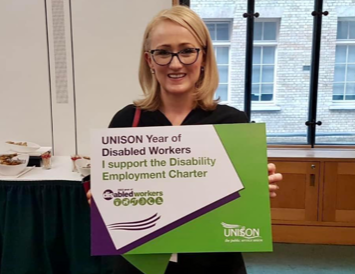Improving Workplace Representation


The way ahead is improving workplace representation and inclusion for disabled people.

Professor Kim Hoque, Warwick Business School, Warwick

As a founding member of Disability@Work, a group of academic researchers with a shared and long-standing interest in addressing the disadvantage disabled people encounter in the labour market, I have sought to draw on my research to engage with, and directly influence, the key players involved in determining the government’s disability employment policy.
Disabled people still face severe challenges in the UK labour market, including an approximately 30% point employment gap and an approaching 14% pay gap (up from about 11.5% in 2014). Slightly more than half of disabled people of working age are employed, compared with over 80% of non-disabled people.
The employment rate for adults with a cognitive learning disability who are known to social services is as little as 6%.
Given the significant and persistent labour market barriers disabled people encounter, I am passionate about identifying ways in disabled people’s employment prospects can be improved, and advocating for increased representation and inclusion in the workplace.
Given this, my Disability@Work colleagues and I have sought for many years to encourage policymakers to engage with the policy recommendations stemming from our research. Instrumental to this has been the collaborations we have forged with leading organisations in the disability field, including the All-Party Parliamentary Group (APPG) for Disability, for whom Disability@Work, in partnership with Disability Rights UK, co-authored a report on halving the disability employment gap in 2016.
These collaborations have been essential in helping us get our policy recommendations onto the radar of government departments including HM Treasury, Cabinet Office, the Department for Work and Pensions, the Department for Business, Energy and Industrial Strategy, and the No.10 Policy Unit.
For example, the collaboration with the APPG for Disability was essential in securing meetings with key Cabinet Office Disability Unit and DWP officials in the spring of 2021, in which we reaffirmed the policy proposals we wanted so see in the forthcoming National Disability Strategy, which was published later that year. Also demonstrating the importance of collaborations, we invited representatives from Scope, Deloitte, the NHS, the Chartered Institute for Personnel and Development, the Trades Union Congress, and the Business Disability Forum into these meetings, to demonstrate the widespread support for our proposals across a range of stakeholders.
In addition, last year, in collaboration with Disability Rights UK, Disability@Work, Leonard Cheshire, Scope, the DFN Charitable Foundation, the Shaw Trust Foundation, and UNISON, I was involved in developing and launching the Disability Employment Charter. This sets out the actions we would like the Government to implement in order to address disability employment disadvantage. The Charter outlines proposals (several of which are underpinned by my Disability@Work research) spanning nine different areas, including in relation to mandatory disability employment and pay gap reporting, and reform of the government’s Access to Work and Disability Confident schemes. It has received widespread backing, with over 100 organisations having signed, including all of the country’s main disability charities (Mind, National Autistic Society, Mencap, Sense, RNIB and RNID), and large corporate organisations such as McDonalds, Herbert Smith Freehills, PageGroup, Schroders, and the Post Office. The British Paralympic Association have signed, as of course, has the University of Warwick, which is also a founder member of the Charter.
This sends a powerful message to government regarding the extent of appetite for substantive change across a range of key stakeholders, and crucially, consensus regarding what this change should comprise. This is something the Government simply cannot ignore.
It is certainly a message Labour has taken on board. In a speech at an event in Parliament organised by fellow Charter founder member UNISON, Vicky Foxcroft MP, shadow Minister for Disabled People, called on the government to implement the Charter’s proposals in their entirety, and with immediate effect. 
Support from the University of Warwick has been instrumental in all of this, with the university providing the funding for my Parliamentary researcher, Roberta Kirosingh, who is based in the Westminster office of the Chair of the APPG, Dr Lisa Cameron MP. This funding led to Warwick Business School becoming the co-provider of the APPG’s secretariat, which has enabled me to play a central role in coordinating cross-party efforts and elevating the profile of disability in Parliament. In acknowledgement of Roberta’s invaluable work, which has included increasing membership of the APPG to over 200 MPs and Peers, securing several Westminster Hall and main chamber debates, and organising events in Parliament on issues ranging from the UN Convention on the Rights of People with Disabilities to changing the media narrative on disabled people, she has won consecutive Parliamentary Staffer of the Year awards over the last two years.
Building on this momentum, in collaboration with the APPG for Disability, WBS co-hosted a Parliamentary reception in June 2022 to promote the Disability Employment Charter. Chloe Smith MP, Minister for Disabled People, spoke at the reception, and the shadow minister was in attendance, as was equality leads from all of the other parties in the Commons. This not only ensured the Charter’s profile continues to grow among Parliamentarians, but it also provides WBS and the University of Warwick with invaluable visibility in Parliament.
We are dedicated to leveraging the Charter to enact meaningful change for disabled people across the UK. Given the disability employment gap has failed to decrease since 2010, and the disability pay gap has increased since 2014, this change cannot come soon enough.
wbs
